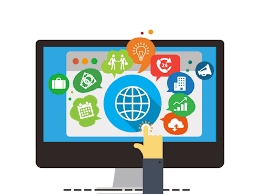
The Importance of Applications in Today’s Digital World
In today’s fast-paced digital era, applications play a crucial role in our daily lives. From mobile apps that keep us connected on the go to desktop software that streamlines our work processes, applications have become indispensable tools for communication, productivity, entertainment, and much more.
Applications have revolutionized how we interact with technology, making complex tasks simple and accessible to users of all levels. With the rise of smartphones and tablets, mobile applications have become a dominant force, offering convenience and functionality at our fingertips.
Businesses also rely heavily on applications to streamline operations, improve efficiency, and enhance customer experiences. Enterprise software solutions automate processes, manage data effectively, and enable organizations to stay competitive in a rapidly evolving market.
Developers play a key role in the application ecosystem by creating innovative solutions that cater to diverse needs and preferences. The constant evolution of programming languages, frameworks, and technologies ensures that new and improved applications continue to enrich our digital experiences.
As technology advances at a rapid pace, the demand for sophisticated applications will only continue to grow. Whether it’s artificial intelligence-driven apps, virtual reality experiences, or blockchain-powered platforms, the future of applications is boundless.
With the increasing interconnectedness of devices through the Internet of Things (IoT), applications will play an even greater role in shaping how we interact with our environment and each other. The potential for transformative impact across industries is immense.
In conclusion, applications are not just tools; they are enablers of innovation, efficiency, and connectivity in today’s digital landscape. Embracing the power of applications can unlock endless possibilities for individuals, businesses, and society as a whole.
Understanding Applications: Definitions, Examples, and Their Role in Computing
- What are 5 applications?
- What is application and examples?
- What are called applications?
- What do mean by applications?
- What are the 10 examples of application?
- What is the synonym of applications?
- What are 5 applications of computers?
What are 5 applications?
When asked, “What are 5 applications?”, the question typically refers to software programs or mobile apps that serve various purposes. Common examples of applications include web browsers like Google Chrome, productivity tools such as Microsoft Office Suite, social media platforms like Facebook, messaging apps such as WhatsApp, and entertainment apps like Netflix. These applications cater to different needs and preferences, showcasing the diverse range of software available for users in today’s digital age.
What is application and examples?
An application, commonly referred to as an “app,” is a software program designed to perform specific tasks or functions on various devices such as smartphones, tablets, computers, and other electronic gadgets. Applications can range from productivity tools like Microsoft Office and Google Docs to entertainment apps like Netflix and Spotify. Social media platforms such as Facebook, Instagram, and Twitter are also popular examples of applications that enable users to connect and share information online. Whether it’s for communication, organization, entertainment, or productivity, applications serve a wide range of purposes and cater to diverse user needs in today’s digital age.
What are called applications?
Applications, commonly referred to as “apps,” are software programs designed to perform specific functions on various devices such as smartphones, tablets, computers, and other electronic gadgets. These applications are created to cater to a wide range of needs and purposes, including communication, productivity, entertainment, education, gaming, and more. By leveraging the capabilities of modern technology and programming languages, applications offer users a seamless and intuitive way to interact with digital devices and access a multitude of services and features tailored to their preferences.
What do mean by applications?
Applications, commonly referred to as “apps,” are software programs designed to perform specific tasks or functions on electronic devices such as smartphones, tablets, computers, and other digital platforms. These applications are created to cater to various needs and purposes, ranging from communication and productivity to entertainment and utility. Essentially, applications serve as tools that enable users to access services, information, and functionalities in a user-friendly and efficient manner, enhancing the overall user experience in the digital realm.
What are the 10 examples of application?
When it comes to examples of applications, there is a wide range of software solutions that cater to diverse needs and functions. Some common examples include web browsers like Google Chrome and Mozilla Firefox, messaging apps such as WhatsApp and Facebook Messenger, productivity tools like Microsoft Office and Google Workspace, social media platforms including Facebook and Instagram, entertainment apps like Netflix and Spotify, navigation apps such as Google Maps and Waze, photo editing software like Adobe Photoshop and Lightroom, gaming applications including Fortnite and Candy Crush, e-commerce platforms such as Amazon and eBay, and communication tools like Zoom and Skype. These examples showcase the versatility and impact of applications in our daily lives across various domains.
What is the synonym of applications?
A common synonym for “applications” is “software.” In the realm of technology, both terms are often used interchangeably to refer to programs or tools designed to perform specific tasks on electronic devices such as computers, smartphones, or tablets. Whether it’s productivity software for work purposes, entertainment applications for leisure, or utility programs for various functions, the synonym “software” encompasses the broad range of digital tools that enhance our daily lives and experiences in the digital world.
What are 5 applications of computers?
Computers have become integral to various aspects of modern life, with their applications spanning across multiple domains. Five common applications of computers include word processing software for document creation and editing, spreadsheet programs for data analysis and organization, graphic design software for creative projects, web browsers for internet access and information retrieval, and video editing tools for multimedia production. These applications showcase the versatility and utility of computers in enhancing productivity, communication, creativity, and entertainment in today’s digital age.
